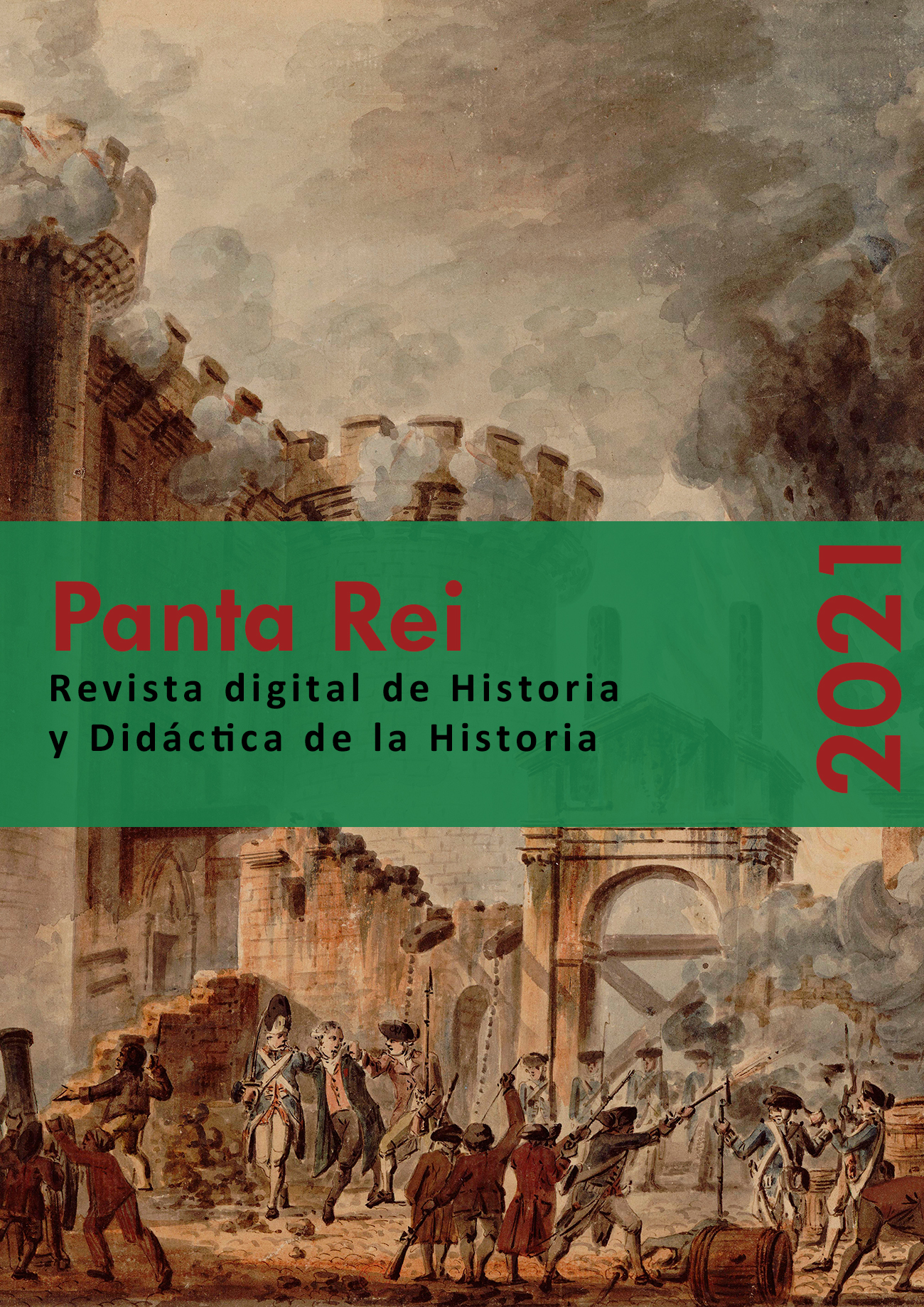Libels, cabals and feasts: a proposal to reconstruct military proclamations in Late Antiquity through the cases of Probus, Magnentius and Julian
Abstract
Despite the large number of military uprisings that occurred in the Roman Empire, and especially in the Third Century, we know very little about how these conspiracies were prepared and executed on paper. Not counting the atypical case of Procopius, related in detail by Ammianus Marcellinus, the literary sources, already problematic and /or scarce in many cases, leave many gaps in the accounts of such processes, which recent historiography tries to fill with hypotheses. Without assessing the motivations of the phenomenon or the degree of responsibility of the different parties involved in the so-called usurpations, we offer an explanatory proposal from the merely technical point of view, that is, how a certain group of conspirators manages to devise, scheme and execute a plan or series of plans with the aim of attaining power through the support of certain military forces and overthrow, almost always assassinating, the reigning emperor.
Downloads
-
Abstract1216
-
PDF (Español (España))620
-
EPUB (Español (España))574
References
Alföldy, G. (1974). The Crisis of the Third Century as seen by Contemporaries, GRBS, 15.1, 89-111.
Ando, C. (2012). Imperial Rome AD 193 to 284: the Critical Century. Edinburgh History of Ancient Rome. Edinburgh University Press.
Aróstegui, J. (1995). La Investigación Histórica: Teoría y Método. Crítica.
Bake-Brian, N. J., y Tougher, S. (Eds.). 2012. Emperor and Author: The Writings of Julian 'the Apostate'. The Classical Press of Wales.
Baldwin, B. (1975). The career of Oribasius, AClass, 18, 85-97.
Bird, H. W. (1984). Sextus Aurelius Victor: A Historiographical Study. Francis Cairns.
Bird, H. W. (1988). Eutropius: his life and career, EMC, 32.1, 51-60.
Birley, A. R. (1976). The Third Century Crisis in the Roman Empire, Bulletin of the John Rylands Library, 58.2, 253-281. DOI: 10.7227/bjrl.58.2.2
Bowersock, G. W. (1978). Julian the Apostate. Duckworth.
Buck, D. F. (1993). Eunapius on Julian´s acclamation as Augustus. AHB, 7, 73-80.
Cambi, N. (2017). Two Inscriptions Discovered in the Immediate Vicinity of Diocletian’s Palace, MHM, 3.1, 139-156. https://doi.org/10.15291/misc.1355
Campbell, B. (1994). The Roman Army, 31 BC-AD 337: A Sourcebook. Routledge.
Cardoso, C. (2000). Introducción al trabajo de la investigación histórica. Conocimiento, Método e Historia. Crítica.
Carrol Bark, W. (1978). Orígenes del Mundo Medieval. Editorial Eudeba.
Casey, J. (1995). Carausius and Allectus: The British Usurpers. B.T. Batsford.
Castillo Lozano, J. A. & Molina Gómez, J. A. (2016). El castigo aplicado al Tyrannus Argimundo según el Chronicon de Juan de Bíclaro, Potestas, 9, 35-52. http://dx.doi.org/10.6035/Potestas.2016.9.2
Colino, C. (2009). Método comparativo. Diccionario Crítico de Ciencias Sociales. Terminología Científico-Social. Plaza y Valdés.
Cromwell, S. (1998). The Rise and Decline of the Late Roman Field Army. White Mane Publishing.
De Carbonnières, P. (1997). Lutèce: Paris ville romaine, collection Découvertes Gallimard (no. 330), série Archéologie. Éditions Gallimard.
Dessau, H. (1889). Über Zeit und Persönlichkeit der Scriptores Historiae Augustae, Hermes, 24, 337-392.
Enjuto Sánchez, B. (2000). La actuación del César Juliano en la Galia, FlorIllib, 11, 55-68.
Enmann A. (1884). Eine verlorene Geschichte der römischen Kaiser und das Buch De viris illustribus urbis Romae, Philologus Suppl., 4(3), 337–501.
Fernández Ubiña, J. (1982). La Crisis del siglo III y el fin del Mundo Antiguo. Akal, serie Historia Antigua.
Goffart, W. (1971). Zosimus, the first historian of Rome's fall, AHR, 76.2, 412-441.
Hanson, R. P. C. (1974). The circumstances attending the death of the Emperor Flavius Valerius Severus in 306 or 307, Hermathena, 118, 59-68.
Harries, J. (2012). Imperial Rome AD 284 to 363: The New Empire. Edinburgh University Press.
Hartmann, U. (2017). The Third-Century “Crisis”. En M. Whitby, H. Sidebottom (eds.), the Encyclopedia of Ancient Battles, vol. III, Part VIII the Late Roman Empire (pp. 1047–1067). John Wiley & Sons, Incorporated. DOI: https://doi.org/10.1002/9781119099000.wbabat0720
Hiland, S., Oliva, Ch. (2013). Le Règne de l'empereur Probus (276 - 282 apr. J.-C.) Histoire et Numismatique. Editions III Monetae.
Leedom, J. W. (1978). Constantius II: Three revisions, Byzantion, 48, 132-145.
López Eire, A. (1996). Semblanza de Libanio. Universidad Nacional Autónoma de México.
Kreucher, G. (2003). Der Kaiser Marcus Aurelius Probus und seine Zeit. Historia – Einzelschriften Band 174. Franz Steiner Verlag.
Matthews, J. F. (1989). The Roman Empire of Ammianus. Duckworth.
Mleczek, A. (2015). The counterfeit and fake emperor–Procopius in the Res Gestae of Ammianus Marcellinus. Classica Cracoviensia, 18, 255-291.
Mocsy, A. (1974). Pannonia and Upper Moesia. Routledge & Kegan Paul.
Morgan, G. (2007). 69 A.D.: The Year of Four Emperors. Oxford University Press.
Norwich, J. J. (2000). Breve Historia de Bizancio. Cátedra.
Omissi, A. (2018). Emperors and Usurpers in the Later Roman Empire: Civil War, Panegyric, and the Construction of Legitimacy. Oxford University Press. DOI: 10.1093/oso/9780198824824.001.0001
Perea Yébenes, S. (2017). Tronos ensangrentados (ca. 251-350). Quiebra del sacramentum militar y traición: de la securitas Augusti al crimen maiestatis. En: L. Montecchio (ed.), Tradimento e traditori nella Tarda Antichità (pp. 1-34). Edizioni Graphé.
Potter, D. S. (2004). The Roman Empire at Bay, AD 180–395. The Routledge History of the Ancient World. Routledge.
Potter, D. S. (2012). Constantine the Emperor. Oxford University Press.
Ricciotti, G. (1959). Juliano: el emperador Apostata: según los documentos. Ediciones Eler.
Richardot, P. 1998. La fin de l'armée romaine: 284-476. Institut de Stratégie Comparée, EPHE IV-Sorbonne.
Sáez-Rosenkranz, I. (2016). El método histórico aplicado a la investigación educativa. REIRE, 9.2, 106-113. DOI: 10.1344/reire2016.9.2927
Sancho Gómez, M. P. (2009). Actitud y pensamiento de Sexto Aurelio Víctor: algunos rasgos de un historiador en la roma tardía, Polis, 21, 37-57
Sancho Gómez, M. P. (2011). Guerra y Política en el Imperio Romano de Occidente (337-361). Editorial Académica Española.
Sancho Gómez, M. P. (2016). Cato temporis sui: contemplando el senado romano tardío desde la Historia Augusta. Falsificación, literatura y pervivencias republicanas, C&C, 11, 247-274.
Sancho Gómez, M. P. (2018). La religión del autor de la Historia Augusta. Universidad de Murcia, Monografías del CEPOAT (Centro de Estudios del Próximo Oriente y la Antigüedad Tardía) 3.
Sanz Serrano, R. (2009). Fundamentos ideológicos y personales en el pronunciamiento del emperador Juliano. Potestas, 2, 83-115. http://dx.doi.org/10.6035/Potestas
Schulten, A. (1949). Sertorio. Editorial Bosch.
Shillam, M. (2007). Abortive Dynasties: Dynastic Politics A.D. 235-285. Tesis doctoral, Universidad de Canberra.
Sidwell, B. (2008). Ammianus Marcellinus and the Anger of Julian. Iris, 21, 56-75.
Scheidel, W. (2013). The first fall of the Roman Empire. Annual lecture held in memory of eminent Roman historian Sir Ronald Syme. Oxford University Press.
Southern, P., Dixon, K. R. (1996). The Late Roman Army. Yale University Press.
Suárez, Montoya, O. (2008). De la téchne griega a la técnica occidental moderna, Scientia et Technica, vol. 2 nº 39, 298-303. DOI: https://doi.org/10.22517/23447214.3235
Syme, R. (1973). Danubian and Balkan emperors. Historia, 22.2, 310-316.
Syme, R. (1983). Historia Augusta Papers. The Clarendon Press.
Syvänne, I. (2015). Military History of Late Rome, 284-361. Pen and Sword Military.
Syvänne, I. (2020). Aurelian and Probus: The Soldier Emperors Who Saved Rome. Pen and Sword Military.
Tomlin, R. S. O. (1979). Ammianus Marcellinus 26.4. 5–6. The Classical Quarterly. 29(2), 470-478.
Tomlin, R. S. O. (1987). The Army of the Late Empire. En J. Wacher (ed.), the Roman World. Routledge Worlds (pp. 107-133). Routledge.
Teitler, H. C. (2017). The Last Pagan Emperor: Julian the Apostate and the War against Christianity. Oxford University Press.
Velaza Frías, J. (2017). ¿El enigma imposible? Veinte años de estudios sobre la Historia Augusta. En J. de la Villa Polo, E. Falque Rey, J. F. González Castro, M. J. Muñoz Jiménez (eds.), Conventvs classicorvm. Temas y formas del Mundo Clásico. Vol. I (pp. 701-730). Sociedad Española de Estudios Clásicos.
Walser, G. (1965). The Crisis of the Third Century AD: A Re-Interpretation. The Bucknell Review, 13.2, 1-10.
Wiemer, H-U., Rebenich, S. (Eds.). 2020. A Companion to Julian the Apostate. Brill's Companions to the Byzantine World.
Wilkes, J. (1992): The Illyrians. Blackwell Publishing.
Woods, D. (1998). Ammianus and Eucherius. ACD, 41, 105-117.
Fuentes
Amiano Marcelino. Historia. Madrid: Akal. 2002. [Edición de Mª Luisa Harto Trujillo].
Dión Casio. Historia romana. Madrid: Gredos. 2004. Biblioteca Clásica Gredos; 325, 326, 393, 395. [Traducción y notas de Juan Manuel Cortés Copete].
Eunapio de Sardes. Vida de filósofos y sofistas. Buenos Aires: Aguilar. 1975. [Introducción, traducción y notas por Francisco de Paula Samaranch Kirner]
Eutropio. Epítome. Aurelio Víctor. Libro de los Césares. Madrid: Gredos. 1999. Biblioteca Clásica Gredos; 261. [Introducciones, traducción y notas de Emma Falque].
Herodiano. Historia del Imperio Romano después de Marco Aurelio. Madrid: Gredos. 1985. Biblioteca Clásica Gredos; 80. [Traducción, introducción y notas por Juan José Torres Esbarranch].
Historia Augusta. Madrid: Akal. 1989. [Edición de Vicente Picón y Antonio Cascón].
Juliano, Emperador de Roma. Discursos. Madrid: Gredos. 1977. Biblioteca Clásica Gredos; 17. [Introducción, traducción y notas de José García Blanco].
Libanio. Discursos. Madrid: Gredos. 2001. Biblioteca Clásica Gredos; 290. III., Discursos julianeos. [Introducción traducción y notas de Ángel González Gálvez].
Orosio, Paulo. Historias. Madrid: Gredos. 1982. Biblioteca Clásica Gredos; 53, 54. [Introducción, traducción y notas de Eustaquio Sánchez Salor].
The Scriptores Historiae Augustae. Cambridge: Harvard University Press. 1968-1980 (3 vols.), (The Loeb Classical Library; 139, 140, 263). [With an English translation by David Magie].
Zósimo. Nueva historia. Madrid: Gredos. 1992. Biblioteca Clásica Gredos, 174. [Introducción, traducción y notas de José María Candau Morón].
Copyright (c) 2021 Miguel Pablo Sancho Gómez

This work is licensed under a Creative Commons Attribution-ShareAlike 4.0 International License.
All the contents published in this journal are subject to an Attribution-ShareAlike 4.0 International (CC BY-SA 4.0) Creative Commons License. You are free to: Share — copy and redistribute the material in any medium or format, Adapt — remix, transform, and build upon the material, for any purpose, even commercially. Under the following terms:
Attribution — You must give appropriate credit, provide a link to the license, and indicate if changes were made. You may do so in any reasonable manner, but not in any way that suggests the licensor endorses you or your use.
ShareAlike — If you remix, transform, or build upon the material, you must distribute your contributions under the same license as the original.
Full text of the license is available in: Creative Commons License 












